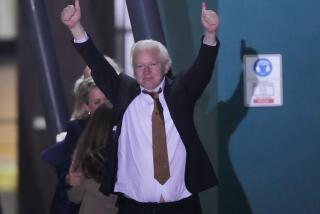Newshounds can’t get scent in Guantanamo
- Share via
GUANTANAMO BAY, CUBA — Separated from terrorism suspect David Hicks by nine miles of water and a wall of secrecy, a dozen journalists from his native Australia gathered round a colleague’s computer here Wednesday to learn details of his guilty plea -- from an official on the other side of the world.
Pens scribbled furiously as footage showed Australian Foreign Minister Alexander Downer briefing lawmakers on Hicks’ confession, which had been hammered out Monday between the U.S. military prosecutors and defense lawyers here at Guantanamo Bay.
Details of Hicks’ plea bargain were news to the journalists who had made their way to this U.S. Navy base to cover the first American military prosecution of a war crimes suspect in 60 years.
The correspondents had to rely on media back home to learn that Hicks would serve just one more year in prison once he is transferred to Australian custody as part of his guilty plea on a single charge of providing material support to a terrorist group.
There’s a veritable news blackout on the deliberations here, making it difficult for all media to gather information. But information about Hicks’ case has circled the globe via the time-honored system of diplomatic dispatches to officials in the Australian capital, Canberra, who then provide details to reporters there.
“We have to spend an hour reading up on what’s happening here,” Stefanie Balogh of News Limited Australia said as she pored over Australian news sites.
Hicks’ emergence as the first terrorism suspect convicted at Guantanamo is front-page news throughout Australia, where Prime Minister John Howard’s Liberal Party faces a tough reelection battle this year and many voters criticize his administration for not winning Hicks his freedom. Hicks has been held by the U.S. since December 2001, when the 31-year-old Muslim convert was captured in Afghanistan.
“We’ve been abandoned on the wind-swept shores and can’t do our jobs,” Mark Davis of Australian SBS TV complained. Like the other 25 journalists from around the world crammed into a tiny anteroom of the barracks where they are accommodated, he had not been able to extract any information about Hicks’ case from Guantanamo officials since Monday.
“I wouldn’t say I’m disappointed,” Davis said. “I’m used to it in Burma and Indonesia and Vietnam. I deal with those militaries all the time. I just didn’t think it would be so blunt and ham-fisted here.”
Australian Broadcasting Co. reporter Michael Rowland booted up the Web page of an Australian newspaper to catch Downer’s comments to Parliament and threw up his hands in frustration when the first confirmation of the plea deal details came from 14 time zones away.
A military spokeswoman here, U.S. Army Maj. Beth Kubala, said Wednesday that no further information was available on whether the judge in Hicks’ case, Marine Col. Ralph H. Kohlmann, had begun evaluating the defense and prosecution briefs detailing what Hicks would confess to. The charge sheet includes 24 specific allegations, such as that he carried an AK-47 while guarding a Taliban tank in Afghanistan, cased the shuttered U.S. Embassy in Kabul and trained at several camps run by radical Muslim organizations.
The closest thing here to a scoop came from the Sydney Morning Herald. It reported the confirmation that Hicks would be required to serve only about one more year in prison once he is returned to Australia -- enough to keep him off the streets and out of the headlines during the political campaign.
“From my sources here, of course,” Herald reporter Mark Coultan said with sarcasm when asked where the newspaper got the information.
In fact it came from his colleague in Canberra, Tom Allard, probably from a government official with access to the diplomatic cables being sent from Washington-based Australian Embassy officials here to liaise with the Pentagon judicial figures and jailers.
*
More to Read
Sign up for Essential California
The most important California stories and recommendations in your inbox every morning.
You may occasionally receive promotional content from the Los Angeles Times.










